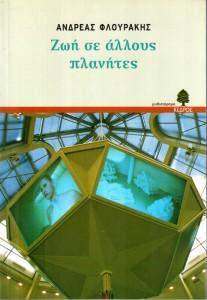…I picture the millions of this city’s inhabitants at this exceptional time of the day standing in the streets, on balconies and on roof tops, with their hands stretched to the sky. I feel their power swaying me in waves. What if they are still asleep or having a hasty breakfast or are off to their jobs? Today it is me and my brother re-enacting the ritual, tomorrow it will be the rest of the world. As we go down the slope, I feel like I have just woken up, together with everyone else in the city. I feel I’m in high spirits while I am walking to the cafe. It is the same one I have been frequenting for years. I am thinking of visiting my old neighbourhood next, the one I grew up in. It’s been a while since the last time I went; it would be a wonderful opportunity to show my brother how the area has ended up. The street, that used to look enormous to us then, now looks quite ordinary. In our childish eyes, the dimensions of the buildings looked impressive but now they have shrunk. Still, because of our current emotion, they retrieve their immense volume. I was certain that my brother wouldn’t recognise the place after all these decades. But I was wrong. Our family house was not a traditional neoclassical house, but a luxurious flat in a block of apartments built in the 30’s. The whole neighbourhood has changed since then. Only a playground and a couple of blocks have remained the same. Not to mention that they look far better than the most recent ones. The secret was not to be found within their layers of paint, constituting a glorious lifting, but rather inside the mass of cement itself. Apart from the pillars and beams, concrete was used for the external surface as well. This was not the case with the next generation of buildings, which, mainly for financial reasons, were only covered with plaster. Our father was a senior civil servant and our mother a rather conservative lady from a well-known family. Father was a really selfish fellow and never wished to receive the tiniest sum from her dowry; everything went to her younger sister. But he was rather well-off himself and on top of that he had an innovative sort of taste for that time. His choice of house when the time came to buy one was proof positive of this. In a small town, like this city was in the beginning of the century, buying a mere “box” of a house – that’s what they called flats back then – was quite extraordinary to say the least. When modern architecture was imported from Europe it was met with plain hostility. After a while the upper class considered modern architecture to be a new trend and many of them found it a great opportunity to show off. I was born between the two World Wars, at the time when the town was enriched with these cubic cages. These blocks of flats were made of reinforced concrete, providing security against bombings. As a matter of course, they were equipped with all the comforts of the time, like radiators, lifts, rolling shutters and bathrooms. That architectural trend somehow fought against all bonds with the past and history, a fact utterly outrageous for a country which had idolised its roots to the maximum extent. On our way to our old house I close my eyes and try to recall how the building used to look. First it’s the entrance: a small step brought the entrance a bit higher than the pavement. The whole front was framed with pleated pilasters and faced the street. —It used to have two plaster columns, one on each side, my brother mentions. How could I ever forget? Then there was a spacious lobby with high ceilings. —There were plaster strips on the ceiling. That much I remember. Likewise, I remember the egg-shaped porter’s lodge. I can even see the porter himself sulking behind it. Everywhere around, the wall was covered with beige marble and right in front of it was the metal cage of the lift. I take my brother by the hand to go up the stairs. We don’t need to take the lift; we used to live on the first floor. My eyes are filled with dust. I can’t keep my hands still, so I tighten my grip around my brother’s hand, to gain some strength. It might be better if we went on another day but it couldn’t be because they were already expecting us. The key unlocks, the door knob turns, the hinges screech and we find ourselves in. Father is seated on the armchair reading the paper while mother is setting the table for lunch. —Off you go and wash your hands. My brother rushes to the bathroom while I’m staring at my parents, rather confused. My father sees me and nods at me. —What’s wrong with you? I don’t say a word. —Come over here. I go close to my father, sit next to his legs and turn my head away from him. —Why are you sulking? I don’t reply and he continues reading his paper. I am not sulking, it’s quite the opposite. After all these years we are all together again.
